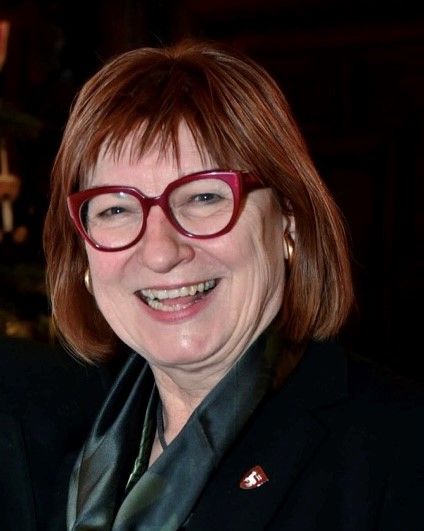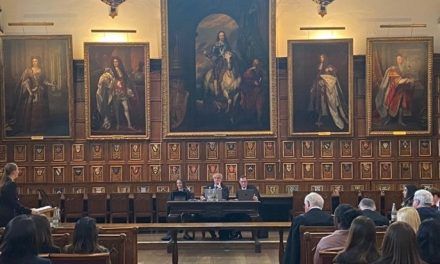There was a time when being a student at an Inn of Court meant ‘eating your dinners’, also known as ‘keeping terms’. A bit bewildering to the uninitiated, you might feel, but be assured, this is no longer a thing. Dinners, as they used to be, have long since been replaced by Qualifying Sessions, which may be linked to a dinner, but very often are not. Instead, they are workshops; lectures, panel discussions, or conversations between specialists in a particular area of law; mock trials; or indeed dinners that are focused on particular areas of law and specific topics for discussion.
It can be difficult to explain what Qualifying Sessions are and what contribution they make to the development of a future barrister. In some ways, it is easier to explain what they are not. They are most certainly not just the dinners which they traditionally were. And although their educational content is more stringently regulated than it used to be, they are not following a syllabus.
For some considerable time now, every Qualifying Session has had to include an identifiable educational element. With some events, it was always self-evident what that element was: Cumberland Lodge weekends are packed with workshops, so no quibble there. Others, say a Private Guest Night, would now start with a short lecture before dinner.
Arrangements became more formalised when the Memorandum of Understanding between the Bar Standards Board and the Inns of Court was adopted in March 2019. Governing all the Inns’ regulated activities, it describes Qualifying Sessions as ‘professional development events of an educational and collegiate nature which complement the vocational component of training for the Bar and foster a community of professional practice’.
In order to count as a Qualifying Session, an event must have an educational element which covers one or more of the following headings:
- Ethics, Standards and Values;
- Advocacy Skills;
- Legal Knowledge, Justice and the Rule of Law;
- Equality; Diversity and Inclusion; and
- Preparation for Pupillage, Career Development and Wellbeing
The Bar Standards Board requires students to attend ten Qualifying Sessions before they can be Called to the Bar. (That’s in addition to meeting all the requirements pertaining to the Bar Course, obviously.) Those ten must include at least one session on each of the above headings, and at least two which require preparation in advance and interaction.
But the prime purpose of attending Qualifying Sessions isn’t just meeting the measurable regulatory requirements. The collegiate element is much more difficult to quantify, but just as important as the educational part. Students meet fellow students from other course providers than their own, members of the Inn from a range of practice areas and seniority, and judges. They become members of the community of practitioners that is the Inn, whose members share the values and ethos of the profession. This will not be achieved by regulation, but by many encounters with people who live and breathe those values.
In the event, the formal changes introduced by the Memorandum of Understanding coincided with the changes which were forced upon us by the pandemic. All of a sudden, our events had to be delivered online, which virtually did away with the opportunity for informal interaction with others. Developing sessions within the formal framework of the five headings was relatively unproblematic, but the invaluable encounters which happen when a few people get chatting in the queue for coffee or over a meal were inevitably lost.
It was clear early on that while we were all longing to return to the opportunities of those informal encounters, there were benefits to remote delivery which we didn’t want to lose. Obvious benefits include greater accessibility for those who find it difficult to come to the Inn, whether because of caring responsibilities, disability, or simply geographical distance; greater flexibility in organising events as there is no need to book rooms; and the option to get speakers who are not based in London or even in the country.
A working group led by Master Nicky Padfield considered what Qualifying Sessions might look like post-lockdown. A balance would clearly have to be struck between those benefits and the need to maintain and foster a collegiate environment.
As far as the educational content is concerned, we took the view that while the five headings are a useful guideline for describing what the bridge between academia and practice might look like, there is a wider aim to be pursued. Barristers need to be more than just experts in their area of law. They need to have a good grasp of human endeavour, an interest in the world beyond black letter law, and an excellent command of the language. The working group liked the concept of what is encapsulated in the German word Bildung: it describes education in the sense not just of training, but a more holistic process of developing as a person.
Accordingly, we have aimed and will continue to aim at producing a programme of Qualifying Sessions which covers a wide range of interests, related to a broader understanding of the law and the way it operates in society. We want it to be informative and stimulating. We are encouraged to find that many of these topics have turned out to be of interest to post-Call members, too, and we are working hard to create events which appeal to all members.
During the Academic Year 2021/22, topics included Cross-Cultural Practice and Communication; Constitutional Statecraft in Asian Courts; Rhetorical Devices; National Security, Failed States and the Rule of Law; Violence Against Women and Girls; Terrorism and the Law in a Liberal Society; in addition, of course, to more obvious topics such as advocacy training, legal research, and workshops on ethical issues. Some of the topics which were covered that year have made their way into this edition of the Middle Templar as separate articles.
The format of delivery was still influenced by Covid measures during 2021/22, but we did manage to offer a blended programme. In addition to remote events, there were in-person lectures and workshops, and even the combination of lectures and dinners and All Inn Dining, effectively an updated version of the traditional dinners.
We recognise that, understandably, students may prefer the remote options which are cheaper and more convenient, but as we have said, they fall short of the full purpose of Qualifying Sessions. In future, therefore, a set number of QS will have to be attended in person, unless there is a good reason for a student not to be able to meet that requirement. To make sure that students attending the course on Circuit are not at a disadvantage, local Education Days will be organised.
One of the changes introduced recently is the involvement of an External Observer. I am encouraged in our approach by Dr Simon Banks, who commented in his 2021 report: ‘The feedback I have received from students has been overwhelmingly positive. I have observed some remarkably engaging and informative Qualifying Sessions and the value of this programme to the students is clear to see.’

Christa Richmond is responsible for the Inn’s Education Department. A graduate of Stuttgart University, she taught German at Bristol University for a number of years before working for Cumberland Lodge. She first joined the Middle Temple when Michael Sherrard established the Inn’s advocacy training programme, and she became Head of Department in 2002.



